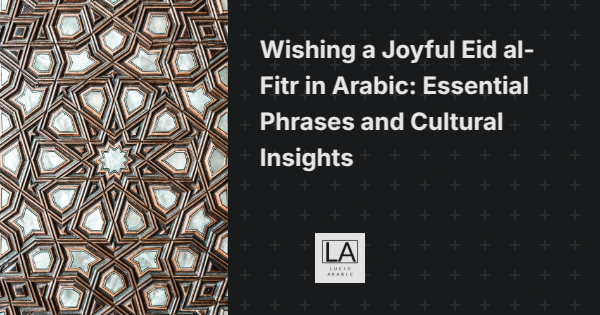Wishing a Joyful Eid al-Fitr in Arabic: Essential Phrases and Cultural Insights
Eid al-Fitr is one of the most joyous celebrations in the Islamic world. It marks the end of Ramadan, a month of fasting, prayer, and reflection. On this special occasion, greetings and well wishes play a significant role in strengthening social bonds and spreading happiness. If you want to wish someone a happy Eid in Arabic, here’s everything you need to know!
The Origin of Eid al-Fitr
Eid al-Fitr, known as the “Festival of Breaking the Fast,” originates from the time of Prophet Muhammad (peace be upon him). It is celebrated on the first day of Shawwal, the 10th month of the Islamic lunar calendar, immediately after Ramadan. The festival was established by the Prophet himself in Medina following the first Ramadan fast observed by the Muslim community. It is a day of gratitude, charity, and celebration, marked by a special Eid prayer, feasting, and giving gifts.
How to Say “Happy Eid” in Arabic
The most common way to wish someone a happy Eid in Arabic is:
- عيد مبارك (Eid Mubarak) – Pronounced: Eid Moo-ba-rak – Meaning “Blessed Eid”
Another widely used phrase is:
- عيد سعيد (Eid Sa’id) – Pronounced: Eid Sa-eed – Meaning “Happy Eid”
Pronunciation Guide
- عيد (Eid): Pronounced as “Eed,” meaning “festival” or “celebration.”
- مبارك (Mubarak): Pronounced “Moo-ba-rak,” meaning “blessed.”
- سعيد (Sa’id): Pronounced “Sa-eed,” meaning “happy” or “joyful.”
Regional Variations of Eid Greetings
Arabic is spoken in many different countries, and Eid greetings can vary slightly depending on the region. Here are some common variations:
- In Egypt & the Levant: Kul ‘am wa antum bikhair (كل عام وأنتم بخير) – “May you be well every year.”
- In the Gulf Countries: Taqabbal Allah minna wa minkum (تقبل الله منا ومنكم) – “May Allah accept [good deeds] from us and from you.”
- In North Africa: Saha Eidkum (صحا عيدكم) – “May your Eid be healthy and blessed.”
These phrases reflect the warmth and generosity of Arab culture, adding a personal touch to Eid celebrations.
When to Use These Phrases
Eid greetings are exchanged throughout the day in different social settings:
- After Eid prayer: As people leave the mosque, they greet one another warmly.
- During family gatherings: It is common to exchange greetings before sharing a meal.
- In public places: Shops, workplaces, and streets are filled with cheerful greetings.
Here are some ways to use these phrases in everyday conversations:
- Greeting a friend or family member:
عيد مبارك! كيف كان رمضانك؟
Eid Mubarak! Kayfa kana Ramadank?
(Blessed Eid! How was your Ramadan?) - Replying to a greeting:
كل عام وأنتم بخير! وأنتم أيضاً!
Kul ‘am wa antum bikhair! Wa antum aydan!
(May you be well every year! And you too!)
Fun Fact: The Spirit of Giving
One unique aspect of Eid al-Fitr is Zakat al-Fitr, a special charity given before the Eid prayer. It ensures that even the less fortunate can partake in the celebrations. This tradition highlights the values of compassion and generosity that define the holiday.
Practice Tip: Engage with Native Speakers
If you want to get comfortable using Eid greetings in Arabic, try the following:
- Send an Eid message to Arabic-speaking friends or colleagues.
- Practice pronunciation by listening to native speakers and repeating the phrases.
- Watch Eid celebration videos to observe how people use greetings naturally.
Try this role-playing exercise:
- Imagine you are visiting an Arabic-speaking country during Eid. Approach someone and say: “Eid Mubarak! Kul ‘am wa antum bikhair!”
They will likely respond with a smile and return the greeting!
Final Thoughts
Eid al-Fitr is a time of joy, unity, and gratitude. Learning how to wish someone a happy Eid in Arabic is a small but meaningful way to connect with Arabic-speaking communities and appreciate their traditions. Whether you say Eid Mubarak or Kul ‘am wa antum bikhair, your words will spread happiness and strengthen bonds.
Discover other lessons of essential Arabic phrase to level up your skills:
Wishing a Happy Ramadan
Say “see you later”

